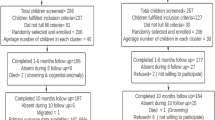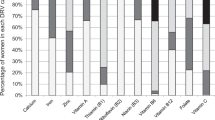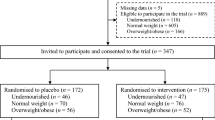Abstract
Objective: To determine the levels of and factors associated with the use of nutritional supplements by children participating in the National Study of Health and Growth (NSHG). Design: Cross-sectional study. Setting: Fifty-six study areas in England and Scotland. Subjects: Fifteen thousand, two hundred and seventy five children aged between 4 and 12 y. Interventions: Parental completion of a self-administered questionnaire on the child's health, social background and supplement use. Height, weight and skinfold measurements. Results: An 88% response rate to the supplement question, 15.9% of responders reported using a supplement. Multivitamins were the most commonly consumed supplement (84%) with 52% taking a supplement daily. Younger children, those whose mothers reached further education, whose fathers were in non-manual occupations or who lived in the Midlands or South were significantly more likely to use a supplement, as were children from smaller families or whose parents were non-smokers. There was no significant association between supplement use and sex, height, birthweight, length of gestation, father's education, number of parents in the home or vegetarianism. Significant differences were found in the use of supplements between the ethnic origin groups. Children of Afro-Caribbean, Asian or other origin were more likely to take a supplement compared to white English and Scottish groups. There were differences in the type of supplements used with Afro-Caribbean and other origin children using more cod liver oil. Conclusion: We support the findings of other studies which show that children with the least need for supplements as defined by socio-economic variables are more likely to receive them and suggest that cultural background is also an important factor in influencing supplement use. Sponsorship: This study was supported by grants from the Department of Health in England and the Scottish Home and Health Department.
This is a preview of subscription content, access via your institution
Access options
Subscribe to this journal
Receive 12 print issues and online access
$259.00 per year
only $21.58 per issue
Buy this article
- Purchase on Springer Link
- Instant access to full article PDF
Prices may be subject to local taxes which are calculated during checkout
Similar content being viewed by others
Author information
Authors and Affiliations
Rights and permissions
About this article
Cite this article
Bristow, A., Qureshi, S., Rona, R. et al. The use of nutritional supplements by 4–12 year olds in England and Scotland. Eur J Clin Nutr 51, 366–369 (1997). https://doi.org/10.1038/sj.ejcn.1600411
Received:
Accepted:
Issue Date:
DOI: https://doi.org/10.1038/sj.ejcn.1600411
Keywords
This article is cited by
-
Predictors for cod-liver oil supplement use — the Norwegian Women and Cancer Study
European Journal of Clinical Nutrition (2004)



